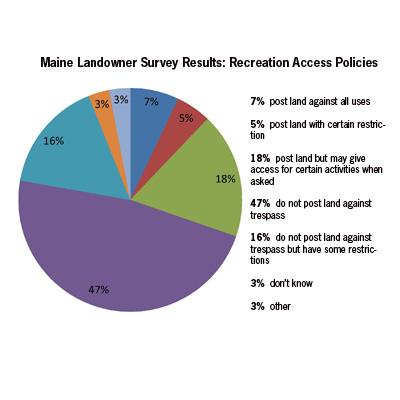Estimating Willingness to Accept Recreation Access Policies, Incentives, and Compensation among Private Forest Landowners in Maine’s Inland Rim Counties

Maine has a traditional open access policy to private forest lands that dates from colonial times. Considering Maine is the most privately owned state in the nation, this access has been a vital asset for recreation, hunting, and fishing. However, recent research indicates that increasingly more landowners are opting to post their land against trespassing. NSRC researchers sought to determine what factors impact landowners’ decisions to allow public recreation access.
Researchers held focus groups with landowners in six locations throughout the state and with recreation, landowner, and agricultural interest groups and government agency representatives to discuss issues related to public recreation access and possible solutions, programs, and policies. Researchers also surveyed landowners throughout the state to learn more about landowner objectives, problems, and program and policy preferences.
Of the more than 800 landowners responding to the survey, nearly half do not post their land and 16% do not post but have some use restrictions. Nearly a quarter of respondents post their land but allow certain activities. Some of the issues that landowners face from public recreation include: unwanted motorized recreation, trail damage, erosion, dumping, damage to vegetation and fences, loss of privacy, and theft. The top program options chosen that would positively influence landowners’ decisions to allow public access include: K-12 outdoor ethics programs, public service announcements, training at ATV registrations, technical assistance, mitigation fund, public media campaign, eliminating landowner liability, and annual tax deductions. Addressing recreation user behavior and encouraging greater respect for landowners and the land may have the greatest impact for small woodland owners in Maine.
Download printable version [PDF]
Download full final report [PDF]
